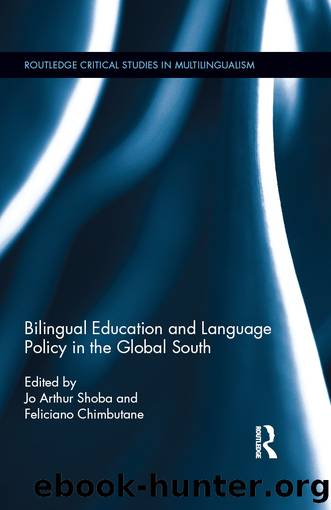Bilingual Education and Language Policy in the Global South by Unknown

Author:Unknown
Language: eng
Format: epub
ISBN: 1170348
Publisher: Taylor & Francis Group
7 Can Sociocultural Gains Sustain Bilingual Education Programs in Postcolonial Contexts?
The Case of Mozambique
Feliciano Chimbutane
INTRODUCTION
As has been pointed out, bilingual education is not just about education: in addition to pedagogical issues, it also gives rise to fundamental issues of a political, sociocultural, and economic nature (Heller 2007; Heller and Martin-Jones 2001).
The situation in Mozambique indicates that while in institutional discourse greater emphasis is placed on the educational value of bilingual education, the beneficiaries in the local communities focus more on its sociocultural value. The use of African languages in schools is viewed by their speakers not only as an official recognition of their own existence as distinct ethnolinguistic groups but also as a vital step towards the reviving of their marginalised language and cultural practices. However, there is disagreement within communities about the socioeconomic value of bilingual education: some community members do not associate bilingual education with any relevant socioeconomic gains, especially when formal markets are concerned, whereas others are now considering the potential material and symbolic affordances associated with the multilingual resources gained through this form of education (Chimbutane 2009, 2011).
Given this context, the question asked is why are people in Mozambique motivated to invest in formal learning of and through their local languages if such languages are not valued or have low exchange value in the mainstream societal markets? Or, more specifically, can sociocultural gains sustain mother tongueâbased bilingual education programmes in the absence of substantial academic and socioeconomic gains?
In this chapter, I argue that the current popular enthusiasm for bilingual education in Mozambique is a response to the stateâs recognition of African languages and cultures, a move which had been awaited since the colonial rule. However, this symbolic value may not be sufficient to sustain the bilingual programme if it continues to fail to deliver convincing academic results, including the pupilsâ attainment of Portuguese language proficiency and associated cultural resources, as these are de facto prerequisites for socioeconomic mobility in Mozambique.
Combining ethnography and discourse analysis, I locate language practices and participantsâ views about bilingual education within their wider sociohistorical and sociopolitical contexts. This analytical perspective is in tune with critical, interpretive approaches to bilingualism and bilingual education (Heller 2007; Heller and Martin-Jones 2001; Martin-Jones 2007), which underscore the view that the interactional level of discourse influences and is influenced by wider sociohistorical and sociopolitical processes.
The analysis offered in this chapter is part of a larger study on the purpose and value of bilingual education in Mozambique (Chimbutane 2009, 2011). Data was collected from two rural bilingual schools, fictionally called Escola Primária Completa de Gwambewni and Escola Primária Completa de Bikwani. The first school is located in a Chope-speaking area (Gwambeni) and the latter in a Changana-speaking area (Bikwani). In addition to classroom observations, data collection also included unstructured interviews with teachers, parents, and other members of the communities in the study. For this chapter, I draw on data from classroom observations, interviews with teachers and parents, and my research diary.
In the next section, I offer an overview of language and education policies in Mozambique since colonial rule.
Download
This site does not store any files on its server. We only index and link to content provided by other sites. Please contact the content providers to delete copyright contents if any and email us, we'll remove relevant links or contents immediately.
The Art of Coaching Workbook by Elena Aguilar(51201)
Trainspotting by Irvine Welsh(21668)
The Secret History by Donna Tartt(19092)
Twilight of the Idols With the Antichrist and Ecce Homo by Friedrich Nietzsche(18635)
All the Missing Girls by Megan Miranda(16031)
Cat's cradle by Kurt Vonnegut(15359)
Ready Player One by Cline Ernest(14677)
Talking to Strangers by Malcolm Gladwell(13370)
Fangirl by Rainbow Rowell(9254)
The remains of the day by Kazuo Ishiguro(9000)
The Compound Effect by Darren Hardy(8969)
Thirteen Reasons Why by Jay Asher(8912)
Tools of Titans by Timothy Ferriss(8396)
Periodization Training for Sports by Tudor Bompa(8273)
Wonder by R. J. Palacio(8113)
The Lover by Duras Marguerite(7903)
A Court of Wings and Ruin by Sarah J. Maas(7848)
Change Your Questions, Change Your Life by Marilee Adams(7783)
The Complete Stick Figure Physics Tutorials by Allen Sarah(7373)
